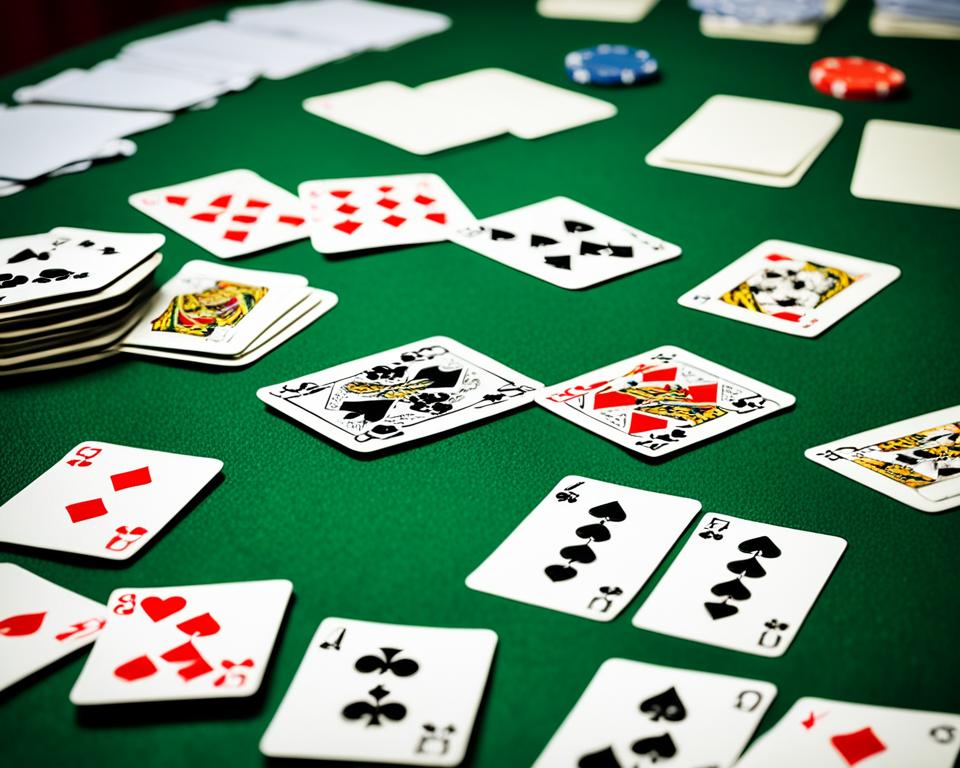When it comes to blackjack, new players often make common mistakes that can negatively impact their gameplay and chances of winning. Understanding these mistakes and how to avoid them is crucial for beginners to maximize their potential at the blackjack table. In this article, we will explore some of the most common errors in blackjack and provide key tips for new players to improve their strategies and decision-making.
Whether it’s overlooking basic strategy plays, misjudging the value of certain hands, or neglecting proper bankroll management, these blunders can lead to unnecessary losses. By recognizing and avoiding these pitfalls, new players can enhance their skills and increase their chances of success in the exciting world of blackjack.
Key Takeaways:
- Understanding and following basic strategy is essential for new players in blackjack.
- New players should avoid common mistakes such as not hitting on soft 18 or splitting tens.
- Proper bankroll management and setting win/loss limits are crucial for long-term success.
- Avoiding insurance bets and over-betting the bankroll can help minimize losses.
- Continuous practice and improvement are key to mastering blackjack strategies.
Not Hitting on Soft 18
One common blackjack mistake is not hitting on soft 18, which refers to having an Ace and a 7 in your hand. Standing on soft 18 is often a mistake because hitting gives you a chance to improve your hand without going bust. For example, if you have an Ace and a 7 (soft 18) and the dealer’s upcard is a 9, hitting can potentially turn your hand into a winner. New players should be aware of the importance of hitting on soft 18 to maximize their chances of winning.
Key Takeaways:
- Soft 18 is a hand consisting of an Ace and a 7.
- Not hitting on soft 18 is a common blackjack mistake.
- Hitting on soft 18 gives you the opportunity to improve your hand without risking a bust.
- Maximizing your chances of winning requires understanding when to hit on soft 18.
Remember, hitting on soft 18 can be a strategic move to increase your odds of winning in blackjack. By taking advantage of the flexibility that soft hands offer, you can make more informed decisions and potentially come out on top. Avoid the mistake of standing on soft 18 and make the most of your opportunities at the blackjack table.
Standing on a Low Hand against a Dealer’s High Upcard
Standing on a low hand in blackjack, typically ranging from 12 to 16, when the dealer’s upcard is strong (a 7-10 or an Ace), is a common mistake made by new players. The fear of busting often drives this decision, but in these situations, it’s usually wiser to hit or even double down, depending on the player’s hand.
For example, suppose you have a hand value of 14 and the dealer’s upcard is a 10. Standing on this low hand significantly decreases your chances of beating the dealer. Instead, consider taking a risk and hitting or even doubling down on that 14 to improve your hand and increase your chances of winning.
By understanding when to hit instead of stand on a low hand against a dealer’s high upcard, new players can make more strategic moves and potentially turn a losing hand into a winning one.
Taking Insurance Bets
When playing blackjack, one of the common decisions that new players face is whether to take insurance bets when the dealer’s upcard is an Ace. While it may seem like a logical choice to protect their hand, statistics indicate that taking insurance bets is generally not advantageous for the player.
Insurance bets in blackjack function as a side bet on whether the dealer has a blackjack. If the player takes insurance and the dealer indeed has a blackjack, the player breaks even on their original bet but wins the insurance bet, resulting in no net loss. However, if the dealer does not have a blackjack, the player loses their insurance bet, and potentially reduces their overall winnings.
“Insuring a blackjack is a losing proposition in the long run. It’s like buying insurance for a hand of poker; it just doesn’t pay off.” – John J. Medina
This strategy can appeal to new players who desire a safety net, but it’s important to understand the mathematics behind it. From a statistical perspective, insurance bets do not provide favorable odds for the player over the long term. The casino sets the payout for an insurance bet at 2:1, whereas the actual odds of the dealer having a blackjack are approximately 9:4. This discrepancy in odds works in favor of the casino, making insurance bets an unfavorable choice for players.
Avoiding insurance bets can help new players steer clear of a common blackjack mistake and improve their overall gameplay. Instead, players should focus on utilizing proper blackjack strategies, such as employing basic strategy and mastering card counting techniques, to increase their winning potential.
Pros and Cons of Taking Insurance Bets
| Pros | Cons |
|---|---|
| Provides temporary relief and peace of mind | Unfavorable odds: Casino’s edge increases |
| If the dealer has a blackjack, the original bet is a push | Loss of the insurance bet if the dealer doesn’t have a blackjack |
It’s important to note that blackjack is a game of skill and strategy, and making informed decisions based on statistical probability is key to long-term success. While insurance bets may seem enticing, avoiding them and focusing on mastering the core strategies of the game will lead to more favorable results in the long run.
Splitting Tens
Splitting a pair of tens is a move that often leads to regret for new players. While splitting tens is allowed in blackjack, it is generally not recommended. Splitting tens divides a strong hand into two weaker ones, and the potential gain rarely outweighs the risk. The sum of a pair of tens is 20, a powerful position in blackjack, and splitting them means taking a chance on two hands that are weaker than 20. New players should avoid splitting tens and focus on playing with a strong hand.

“Splitting tens is like splitting your power in half. It’s not worth it. You have a winning hand, so why take unnecessary risks?” – Blackjack Pro
If you have a pair of tens, you already have a strong hand. Splitting them sacrifices the advantage of a total of 20, which is difficult for the dealer to beat. In most cases, splitting tens will result in two hands that are weaker than 20, increasing the likelihood of losing both hands. Splitting tens is a move best left to more advanced players who understand the nuances of the game and have a specific strategy in mind.
There are only a few scenarios where splitting tens can be considered, such as when the casino offers special rules that favor splitting, or if you are counting cards and the count is highly in your favor. However, for the average player, these situations are rare and should not influence the decision to split tens.
Remember, blackjack is a game of probabilities, and splitting tens decreases the probability of winning. It’s important to make the most of your strong hands and capitalize on the advantage they provide. Avoid the temptation to split tens and focus on playing with a winning strategy.
Over-betting the Bankroll
Over-betting the bankroll is a common mistake that new players should avoid. It refers to wagering more money than one can afford to lose. Over-betting can lead to hasty decisions at the blackjack table and can quickly deplete the player’s bankroll. Proper bet sizing is crucial to ensure that players can ride out any ups and downs and play responsibly. Avoiding over-betting is an important aspect of bankroll management for new players.

“When it comes to bankroll management in blackjack, responsible betting is the key.”
– Blackjack Pro
Importance of Bankroll Management
Bankroll management in blackjack is essential to mitigate financial risks and maximize playing time. By adhering to responsible betting practices, players can safeguard their bankrolls and make informed decisions at the table. Thorough understanding of proper bet sizing and disciplined bankroll management can greatly enhance a player’s blackjack experience.
Tips for Responsible Betting
To avoid over-betting the bankroll, new players should consider the following tips:
- Evaluate your bankroll: Determine the amount of money you can comfortably allocate to playing blackjack. It is crucial to only wager an amount that you are prepared to lose.
- Set betting limits: Establish maximum bet sizes based on your bankroll. This ensures that you do not wager more than a predetermined portion of your funds on any given hand.
- Stick to a betting strategy: Choose a betting strategy that aligns with your bankroll and risk tolerance. Whether you prefer flat betting or progressive betting systems, consistency in your approach is key.
- Monitor your bankroll: Keep a close eye on your bankroll throughout your blackjack session. Regularly assess your wins and losses to determine if adjustments to your betting strategy are necessary.
Budget-Friendly Bankroll Management
Implementing proper bankroll management techniques not only prevents over-betting but also allows for long-term enjoyment of the game. By using a practical approach to betting, players can consistently make responsible decisions and extend their playing sessions.
| Bankroll Size | Maximum Bet Size | Playing Time |
|---|---|---|
| $100 | $5 | 20 hands |
| $500 | $25 | 100 hands |
| $1000 | $50 | 200 hands |
Note: The above table provides an example of how different bankroll sizes can impact maximum bet sizes and playing time. It is important to adjust these values according to your individual circumstances.
By implementing responsible betting strategies and avoiding over-betting the bankroll, new players can enjoy a more controlled and rewarding blackjack experience.
Ignoring Blackjack Bankroll Strategy
Neglecting proper bankroll management is a mistake that many players make. It is crucial to consider blackjack bankroll strategy in order to maximize your chances of success. Ignoring this strategy can lead to financial losses and hinder your long-term progress in the game. To avoid these pitfalls, it is important to set aside a specific bankroll for blackjack and adhere to guidelines for bet sizes.
When it comes to bankroll management, players should establish a dedicated amount of chips to be used exclusively for playing blackjack. This helps to ensure that the funds allocated for the game are separate from other personal finances. By setting aside a specific bankroll, you can better track your wins and losses and implement a more focused strategy.
Furthermore, guidelines for bet sizes play a crucial role in bankroll management. It is essential to determine your bets based on the size of your bankroll. Betting too much in relation to your bankroll can lead to quick and substantial losses, while betting too little may limit your potential winnings. Players should find a balance between aggression and moderation, taking into account their individual risk tolerance and financial situation.
“Proper bankroll management is the foundation of successful blackjack play. By adhering to a predetermined betting limit, you can protect yourself from major financial setbacks and maintain a disciplined approach to the game.”
Additionally, it is important to establish a predetermined betting limit and never exceed it. This helps to prevent impulsive decisions and emotional wagering. By setting a limit on your bets, you are effectively managing your risk and protecting yourself from potential losses that could compromise your bankroll.
Overall, ignoring blackjack bankroll strategy is a common mistake that new players should avoid. By implementing a proper bankroll management plan, setting guidelines for bet sizes, and adhering to a predetermined betting limit, players can enhance their chances of long-term success in the game.
| Benefits of Blackjack Bankroll Strategy | |
|---|---|
| 1 | Protection against major financial losses |
| 2 | Improved tracking of wins and losses |
| 3 | Disciplined approach to betting |
| 4 | Enhanced risk management |
| 5 | Optimized balance between aggression and moderation |
Failing to Set Win/Loss Limits
Not establishing win and loss limits is a common mistake made by new players. Setting these limits is essential to maintain discipline and avoid wild swings in session outcomes. Before starting a blackjack session, players should decide on a target profit (win limit) and a maximum loss (stop-loss). This helps to keep emotions in check and allows players to play their smartest game. Failing to set win/loss limits can result in impulsive decisions and potentially large financial losses.
Setting win/loss limits is an effective strategy in managing bankroll and ensuring responsible gambling. By determining an achievable profit target, players can lock in their winnings and prevent the temptation to chase more. Similarly, setting a stop-loss limit helps protect the bankroll from excessive losses.
Not only do win/loss limits provide a safeguard against emotional decision-making, but they also help players maintain focus and concentration throughout their blackjack sessions. By setting these limits in advance, players can approach the game with a clear mindset and make informed decisions based on strategy rather than impulsive reactions.
Here is an example of how win/loss limits can be implemented:
| Session | Starting Bankroll | Win Limit | Stop-Loss Limit | Outcome |
|---|---|---|---|---|
| 1 | $500 | $200 | $100 | + $150 |
| 2 | $650 | $200 | $100 | – $70 |
| 3 | $580 | $200 | $100 | – $120 |
In the example above, the player sets a win limit of $200 and a stop-loss limit of $100 for each session. In session 1, the player achieves a profit of $150 and decides to end the session. In sessions 2 and 3, the player experiences losses exceeding the stop-loss limit and chooses to conclude the sessions to avoid further losses.
By setting win/loss limits, players can protect their bankrolls, exercise self-control, and approach blackjack with a strategic mindset. It is an essential practice for both new and experienced players alike.
Incorrect Basic Strategy Plays
Understanding and following basic blackjack strategy is fundamental for new players. Many players make critical mistakes by not adhering to the correct strategy for their hand and the dealer’s upcard. Basic strategy provides players with the optimal move for every possible hand combination. Straying from these guidelines can significantly reduce the player’s chances of winning.
New players should invest time in learning and practicing basic strategy to improve their gameplay and increase their chances of success.
Common Basic Strategy Mistakes
“I had a soft 18, and the dealer’s upcard was a 9. I thought it was better to stand, but I was mistaken.”
“I split a pair of tens because I thought it would give me more chances to win. I learned the hard way that it was a bad move.”
By avoiding these incorrect basic strategy plays, players can greatly enhance their odds in blackjack. Instead of relying on gut feelings or guesswork, following the optimal strategy provides a scientific approach to the game.
| Hand | Dealer’s Upcard | Optimal Move |
|---|---|---|
| Soft 18 | Dealer’s Upcard: 9, 10, Ace | Hit |
| Pair of Tens | Any Upcard | Never Split |
Remember, blackjack is a game of skill and strategy. Improving your knowledge of basic strategy will give you a solid foundation to build upon as you continue to refine your gameplay.
By following the optimal strategy and avoiding incorrect basic strategy plays, you can dramatically increase your chances of success in blackjack. Don’t leave your gameplay to chance – study and practice basic strategy, and take your blackjack skills to the next level!
Conclusion
Mastering blackjack strategy is a journey, not a destination. As new players embark on their blackjack adventure, it is crucial to recognize and avoid common mistakes to improve their chances of winning. By following the tips mentioned in this guide, players can steer clear of blunders such as not hitting on soft 18, standing on a weak hand against a dealer’s strong upcard, taking insurance bets, and splitting tens. They should also be mindful of over-betting their bankroll, ignoring proper bankroll management, failing to set win/loss limits, and making incorrect basic strategy plays.
Remember, blackjack is a game of skill and strategy. Continuous practice and improvement are essential to ensuring success at the tables. It is important to play responsibly, keeping in mind the dos and don’ts of the game. By avoiding these common mistakes, new players can enhance their gameplay, maximize their chances of winning, and have an enjoyable and rewarding blackjack experience.
So, take these insights to heart, keep honing your skills, and may luck be on your side as you navigate the fascinating world of blackjack!
FAQ
What is a common mistake in blackjack for new players?
Not hitting on soft 18, which can improve the player’s hand without going bust.
When should I hit on soft 18?
It is generally recommended to hit on soft 18 when the dealer’s upcard is a 9.
What is another common blackjack mistake?
Standing on a low hand (typically 12-16) when the dealer’s upcard is strong.
Should I stand on a low hand against a dealer’s strong upcard?
It is usually wiser to hit or even double down on a low hand against a dealer’s strong upcard.
Are insurance bets a good idea in blackjack?
Taking insurance bets is generally not recommended, as statistics show they don’t work out in the player’s favor over the long run.
Can I split a pair of tens?
While splitting tens is allowed in blackjack, it is generally not recommended due to the risk involved.
What is over-betting the bankroll?
Over-betting the bankroll refers to wagering more money than one can afford to lose, which can lead to hasty decisions and financial losses.
Why is it important to follow blackjack bankroll strategy?
Proper bankroll management, including setting aside a specific bankroll for blackjack and adhering to guidelines for bet sizes, helps players play responsibly and avoid financial losses.
Should I set win and loss limits when playing blackjack?
Yes, setting win and loss limits is crucial to maintain discipline and avoid impulsive decisions that can result in large financial losses.
Why is it important to follow basic blackjack strategy?
Basic strategy provides players with the optimal move for every possible hand combination, increasing their chances of winning.
How can new players avoid common mistakes in blackjack?
By recognizing and avoiding common mistakes such as not hitting on soft 18, standing on a low hand against a dealer’s high upcard, taking insurance bets, splitting tens, over-betting the bankroll, ignoring blackjack bankroll strategy, failing to set win/loss limits, and making incorrect basic strategy plays.





